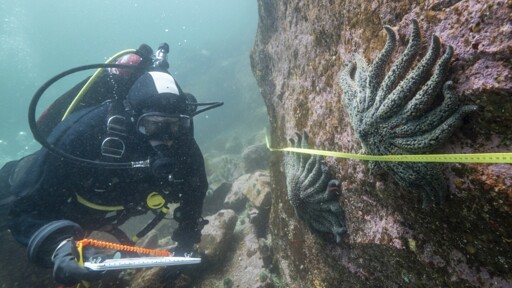Scientists say they have at last solved the mystery of what killed more than 5 billion sea stars off the Pacific coast of North America in a decade-long epidemic.
The culprit? Bacteria that has also infected shellfish, according to a study published Monday in the journal Nature Ecology and Evolution.
Now that scientists know the cause, they have a better shot at intervening to help sea stars.
Prentice said that scientists could potentially now test which of the remaining sea stars are still healthy — and consider whether to relocate them, or breed them in captivity to later transplant them to areas that have lost almost all their sunflower sea stars.
Aaaaannnnd, the bacteria thrives because of warming ocean temps, which aren’t going down anytime soon
Where are you reading that? I saw nothing in the article or linked abstract.
Poked around a bit and it seems the north Pacific is rapidly warming, but this epidemic stretches from Alaska to Mexico.
Now that scientists have identified the pathogen that causes SSWD, they can look into the drivers of disease and resilience. One avenue in particular is the link between SSWD and rising ocean temperatures, since the disease and other species of Vibrio are known to proliferate in warm water, Gehman says.
Thanks! Did I miss that somewhere in the OP?
No. I just looked up another source.
At this point in time the oceans are all warming rapidly, given that in past, as best we understand it, the composition of the atmosphere has rarely changed as much as fast as it has in the past couple hundred years, and the ocean temperatures are doing the same in that they are also changing at a pace rarely seen in the historical record. Some lucky places in the ocean are warming even faster than the overall rapid temperature change; while a pot of water on the stove might only have bubbles just starting to boil into sight only on the bottom, the whole lot is getting hot.
It’s kind of impossible for substantial and prolonged ocean temperature changes in one area to not eventually impact others.
And I would’ve gotten away with it too if it wasn’t for you meddling kids!
They got hit with the starfish version of the Black Death, except worse. Seems like evolution should sort this quickly. The few survivors should be immune, but I have no idea how long it takes for them to reproduce.
Had no idea how voracious those little fuckers are! If sea urchins are now an issue, maybe we should start scarfing them down? LOL, we do that in Florida with invasive lionfish. Divers are legally “weapons free” on those beasts and compete to see how many they can harpoon and bring back to restaurants.
I remember watching a short documentary about lionfish hunting, and iirc they turned to allow hunting after they weren’t able to teach sharks to eat them. They only succeeded in teaching the sharks that if they harass a diver, there might be a tasty lionfish treat.

Humans.
They’re the worst.
It’s the bacterium Vibrio pectenicida, of the same family as Vibrio cholerae. Humans only exacerbated this by rising temperatures but it wasn’t us directly.
We didn’t cause it, but we certainly accelerated it.
Spoiler alert: The answer is capitalism. It almost always is.




